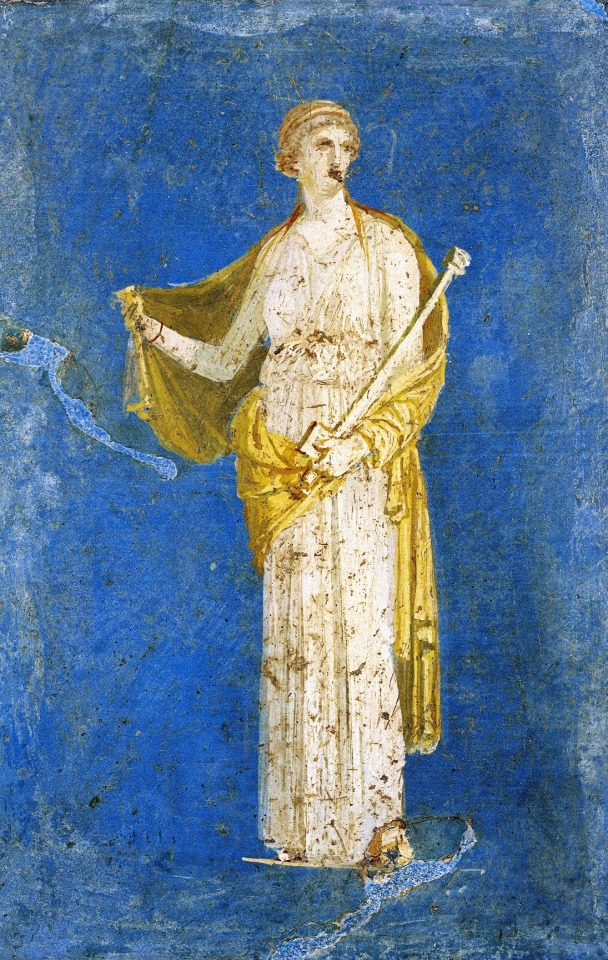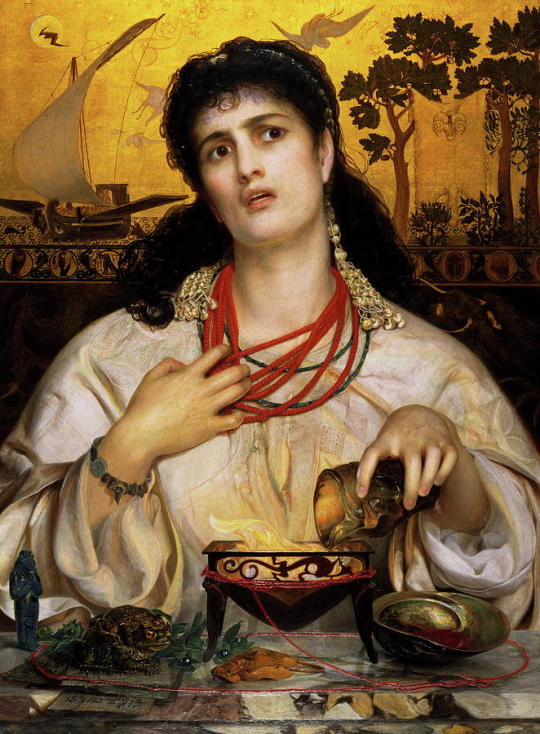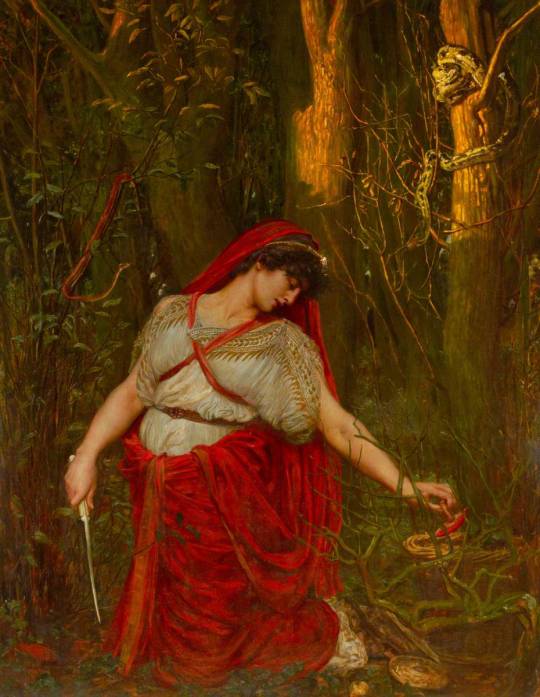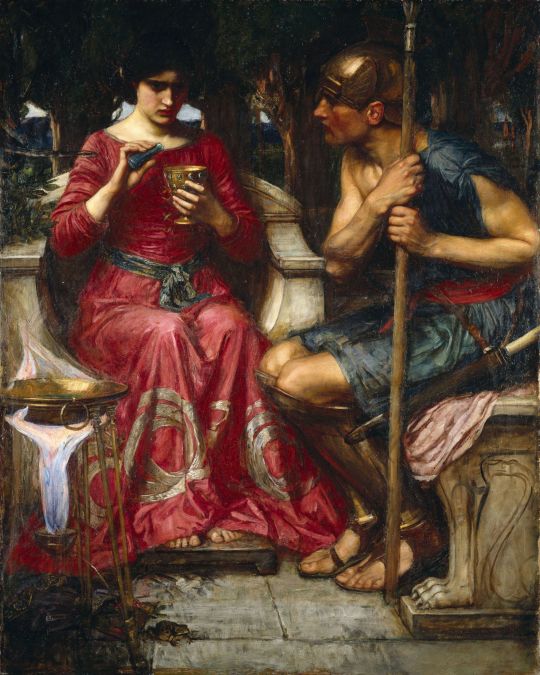Text
Spotting a Malevolent “Guide”

When first getting into any type of entity work, one of the first things people tend to do is look for some sort of guide. Be that a Higher Self, patron deity, spirit guide, guardian angel, whatever you want to call it- just something more powerful and knowledgable than us to keep us on the right path.
I believe most entities are generally good, or at least aren’t motivated to harm us. That said, there are those with something to gain from taking advantage of us. A practitioner in search of a guide is a juicy target, because they’re often inexperienced and naive. Consider everything we’re willing to do to please someone we consider a mentor. Here’s how to spot a phony:
There’s a bad feeling in your gut. This is the first and most important one on the list. If something feels off, something feels wrong, even if there’s no obvious reason why, listen to your gut. It’s the most energy-sensitive and accurate tool you will ever have.
Their identity is shady. This is especially true if they’re claiming to be a deity or any big entity with a name you’ve heard before. A deity should have no qualms just saying who they are, whereas an impostor may try to dance around saying it explicitly. They may pull a “you know who I am” or just confirm whatever you give them. Asking them to prove their identity for your own security should never be offensive.
They’re isolating you from other sources. Are they encouraging you to avoid certain books, certain (not harmful) activities and people? Watch out. By making themselves your only resource, they keep you from learning info that would expose them and keep you reliant on them. Mentorship shouldn’t equal total dependence on them.
Their instructions are harmful. There’s something to be said for doing something outside your comfort zone, but there’s a clear difference between that and something destructive. If a “guide” is telling you to harm folks (including yourself,) mess with your diet in an unhealthy way, abandon helpful behaviors, etc., then that entity does not have your best interests in mind.
You’re giving more than you’re getting. The relationship is more about what you’re giving them, how you’re serving them, and doing what they say, but you aren’t actually learning anything. Your growth is not proportional to what you’ve been putting in to receive their guidance. They may keep delaying your lessons or only dolling out #wisdom instead of useful advice. You’re stuck constantly trying to ‘prove’ you’re ready.
This spirit is bad news! What do I do?
Don’t blame yourself. It happens to the best of us, and getting duped or manipulated is never your fault. Consider it a learning experience.
Tell them to leave. The deal is off, you’ve caught onto their bs, and it’s time for them to leave you alone for good. Lots of spirits will willingly peace out once they’ve been caught. If they refuse to leave…
Banish them. Break out the sage bundles, the candles, the heavy metal music, whatever you need to do. If you need, ask a trusted friend to help. Even online pals may be willing to just send you some energy.
Cleanse everything. Cleanse your space, cleanse your tools, cleanse yourself. Get rid of any lingering energies the phony may have left.
Ward everything. Set up your security system so that the phony can’t return, and other fake guides can’t get in.
Tattle. If the phony was claiming to be a deity or another entity with a name, feel free to let the real entity know. “Hey Apollo, there’s a harmful spirit ‘round these parts who’s claiming to be you.” Rest assured they will handle it accordingly.
4K notes
·
View notes
Text
My daily ritual format 🌙🕯️

So I thought of sharing this format I've been thinking of for a long time, because perhaps it can help someone! I know getting used to praying everyday can be difficult, even when you really want to get closer to the Gods. I've seen other formats on the internet, but most of them are very elaborated and as a low spoon devotee who doesn't always have the time to prepare everything, they're not something I would do daily, even if I promise it to myself or the Gods.
So: there are people that have been on this path for a long time and are willing to (either because of habit, reverence, or discipline) do those longer and more elaborate daily rites. But let's be real, when you're new to this, haven't taken an oath, are not that experienced with polytheism or have any impediment (be it physical or emotional, or anything else) —you're not gonna do those rites. Even if you start trying, you will probably leave it at some point. But! Don't think the Gods would get disappointed at you for this. On the contrary, if this has ever happened to you, take it as a chance to know yourself and your limitations. Anyway, no more wording. Here's the ritual format:
* This rites are designed to be done after showering (so you can be clean and presentable for the Gods) so try to fit that into your schedule. If for whatever reason you can't do them after showering, then find another time and just focus on cleaning up a bit and doing khernips.
* You don't have to do khernips daily. However, you should use them everytime you do a rite. Do them once a week and keep the water somewhere you can still use it for the rest of the week. You don't even need bay laurel —try drawing a cleansing/purifying sigil on a pice of paper and burn that. It doesn't have to be river or mountain water either, use tap water and sprinkle some salt into it. If you want, you can bless the salt beforehand in order for it to have the sole purpose of purifying the water. Whatever you feel is more practical and comfortable.
Rise offering or light incense (I personally have a different type of incense each day, dedicated to different Deities. Another tip: if you drink coffee, water or tea, offer a slip of that —it also creates a more intimate bond with the Deities, since you're sharing)
Offer the first portion to Hestia. Say something like: As always, the first portion goes to you, Mother Hestia, who takes care of this family and keeps us warm.
Offer another portion to the Deity of the day. It's part of my practice to dedicate each day to a different Olympian/Chthonic Deity. If you have any special candles for said Deity, light them up now. For example, I devote Mondays to Artemis and Hekate, so I would say something like: I offer a second portion of this [incense] to Lady Artemis and Mother Hekate, who I dedicate this day to. Have your devotee in mind and let me bask in your holy light as always.
Offer last portion to household & patron Deities. In my case, it's Apollo, Hermes and Aphrodite so I would say something like: Beloved Apollo, Bright Hermes, and Lovely Aphrodite: enjoy the rest of this offering [of incense] and guide me today as always. May your sacred blessings reach me in a way I can be able to recognize, and may I delight in your sacred presence today as yesterday. I love you.
Optional: Meditate. At least five minutes. Stay silent, listen, feel. Just accept. Ask for guidance, but on some slow instrumental or a guided meditation of your choice. Think of your purpose and manifest it, or ground yourself, or focus on visualizing in order to strengthen your connection to the Gods. You can also do a little tarot spread if you're in a hurry, grab a card or two and have their positive message in mind throughout the day.
Give thanks, from your heart. I would usually say something like: Precious Gods, enormous powers of the Universe, I give you thanks for the uncountable gifts I receive from you daily. I only ask for one thing: for my loved ones, me, and humanity as a whole to be able to know peace and love in abundance.
Close the rite. If it feels weird to just walk away then say something; that the ritual has come to an end and you wish for Them to enjoy the offerings, ask Them to tell you throughout the day about anything they want you to know, if the offerings are propitious, if there's anything They want you to change or add to your sacred time, etc. Ask them to stay in communication with you. If you have trouble noticing their signs you can also connect to your Higher Self in meditation for you to be more opened to the Gods.
Do this ritual whenever you feel comfortable throughout the day. Showering or taking a bath relaxes your mind and it's good to approach the Gods with a peaceful mentality, so do whatever makes you feel serene before the ritual takes place. Also, keep the Gods in mind when you're finished. Talk to Them throughout the rest of the day, practice Their virtues, dedicate different activities to Them. They love to be present with us!
I hope this helps someone! You can add or change anything to the format in order to make it more yours.
Blessed be and may the Gods fill your life with sweetness! 💗
611 notes
·
View notes
Text
Morning and Evening Prayers for Artemis, Apollon and the Agathos Daimon
Morning Prayers, in order:
Apollon Paion,
Beautiful healer of all mortals,
You with voice and lyre of gold,
As your bright sun rises, I greet your brilliance,
And ask for your radiant blessings,
That your passion runs through my veins.
Show me that which I cannot see,
And let your fire ever burn in my heart.
Artemis Potnia Theron,
Queen of Beasts,
You who protects all girls,
As a new day dawns, and your soft moon wanes,
I greet you and ask for your radiant blessings,
That your strength runs through my veins.
Show me how to be myself, unapologetically,
And let your hymns ever sing your glory through me.
Agathos Daimon, my companion,
Who comes beside me in every step,
Turning away evil and protecting me always,
As a new day dawns, and Helios rises,
I greet you and ask for your protection,
That you once again walk beside me, Zeus Ktesios.
Show me always the correct path to tread,
And guide my feet always, oh, wise Agathos Daimon.
Evening Prayers, in order:
Artemis Selasphoros,
Bringer of the light of the moon,
Hekatebolos, Khrysalakatos,
Now I come before you as your silver moon rises,
In piety and in thanks for all you have given me,
And for your voice, which ever brings me delight.
Apollon Mousegetes,
As you have lead the Mousai,
You lit the lamps before me today.
And now I come before you as your bright sun wanes,
In piety and in thanks for all you have given me,
And for your light, which ever grants the sparkle in my eyes.
Agathos Daimon,
As sure as the sun has shone bright today,
Such has your unwavering companionship.
I come before you as Zephyrus claims Helios once more,
In piety and in thanks for all you have given me,
And for your endless guidance and protection.
My order is simply because of the times of day that are most associated with them, always ending with the Agathos Daimon, to keep them close. Epithets are probably transliterated a bit incorrectly, I need to double check.
1K notes
·
View notes
Photo

Tarot spread for when you’re feeling frustrated and blocked. When there’s something wrong but you can’t quite figure what that is.
The cork, what’s keeping card five trapped.
What you need to keep an eye out for, the negative repercussions that this reveal will give you
The positives that will come from this being let into the light
What you should do to work on the negatives of card two, how to move further through them.
The central issue, the thing that needs to be let out into the light
How the positives found in card three will inform and shape and improve your life.
This spread actually helps me a lot with shadow work - if I keep running up against an emotion I can’t figure out the reason for, I work on this, but it also helps when I’m feeling stifled.
8K notes
·
View notes
Photo

2K notes
·
View notes
Text
Hygeia, gentle goddess, guide me in my routine. Help me every day to remember you and honor you with cleanliness and with the hygiene of my body. Keep sickness at bay, and let my body be a temple, maintained with perfect care and pleasing to your eyes.
197 notes
·
View notes
Text
Me giving an offering to an ancient deity at three in the morning

37K notes
·
View notes
Note
Hi Adri!! I love your blog, and I hope you're doing well! <3 If you don't mind, I'm looking for some advice. Lately, I've been struggling a lot with my faith and have been having a lot of doubts and skepticism. I was raised irreligious, so it's hard for me to let go of my skepticism. Because of that, I let my worship slide. I used to give weekly offerings to Ares and Hermes, an I just stopped. Now I don't know how to pick up my worship again. I'm so worried I pissed them off and dunno what to do
Thank you anon and you too! Enjoy your day <3 And of course I don’t mind. You have a genuine concern that many of us deal with. I’d also say to check out this post, because it might help. There’s also good points in there that may help you more.
I don’t think they’d be mad at all — tell them what’s going on. Communication is key. I’ve fallen out of worship too before, such as with my heroes for a bit (big sob). Simply tell Ares and Hermes what’s going on and maybe ask for help. It’s okay to ask the gods to help you keep faith.
Personally what helps me is reading about them more. Reading is what helps me connect to my heroes and the theoi in a way, for some reason. Or it explains some experiences I’ve had.
Also, I like to keep this in mind: so what if it’s not “real.” It makes me happy. This religion has helped me grow so much. I’m glad to have gods, heroes, and spirits that I can connect with. It’s okay to have doubt. Skepticism is healthy, just don’t let it erode you. And so what if it’s not “real.” If this makes you happy, if the gods and heroes help you, and you’re healthy, it doesn’t matter if it’s not “real.” Religion does not make us less rational and it certainly doesn’t make us “crazy.”
I’d say to try doing something small, at least. It’ll help you get back into the motion of things. Or burn a candle, I love doing that! I hope my input helps. I hope things get better, I understand your situation.
If anyone else wants to add input to support anon here, please do. Community support is important.
13 notes
·
View notes
Text
Heads up Hellenic friends but Galina Krasskova has a novena to Apollo that just came out called Of Bow, Lyre, and Prophetic Fire. Please don't support her she's gone full alt-right fash trash.
1K notes
·
View notes
Text

Hello! Here’s another installment of my huge #annobib series of book recommendations.
This article focuses on books about spirit work in particular! If you’re at all interested in working with spirits, do peruse these works - you may find something you like!
Spirit Conjuring for Witches, by Frater Barrabbas. Frater B. is a very learned and rather famous magician and witch. This book is mostly geared towards Wicca, but even if you’re not Wiccan, his techniques are innovative and interesting, many utterly unlike anything I’ve seen elsewhere!
Familiar Spirits, by Donald Tyson. Though geared towards ceremonialists, any practitioner can likely learn a thing or two from Tyson’s interesting stroll through the whys and wherefores of spirit work and thoughtform creation. This is by far the best book I’ve seen on the topic of familiar spirits.
Egregores, by Mark Stavish. The only book I’m aware of that focuses specifically on egregores, or human-crafted spirits that form from our endeavors and organizations. This book is not without it’s problems, though - it often takes a sensationalist tone, and can be a bit conspiracy-mongering. Still a good read!
The Witch’s Book of Spirits, by Devin Hunter. Mr. Hunter is always a treat, and does not disappoint here, with his easily-understood explanations of various spirit phenomenon and entities, how to contact and manage relationships with them. Best for beginners!
Spirit Speak, by Ivo Dominguez. An extremely dense and detailed book. Not recommended for beginners, but excellent for intermediate or advanced spiritworkers interested in taking their magick to the next level. Mr. Dominguez clearly has a great deal of experience to share.
Demons and Spirits of the Land, by Claude Lecouteux. This is another more advanced book, offering historical perspectives on land-spirits (also known as genius loci). It reads like a history textbook, not going to lie! But, it’s worth picking up!
Fairies: A Guide to the Celtic Fair Folk, by Morgan Daimler. Hands down, this is the best book I’ve found about the Gentry, and will get you started towards understanding Them. Daimler, as the title suggests, writes from a Celtic perspective, though.
Thanks for reading, and I hope you’ll have a glance at some of these excellent books! Spiritwork is important to many of us, and if it interests you, why not explore more?
Please check out the rest of my huge series of book recommendation lists here on my blog - they’re all tagged #annobib!
Also, if you decide to purchase any of these books, and you do it through the above links provided, I get some pocket money! I, of course, would love that, and I totally promise not to spend it all on energy drinks!
1K notes
·
View notes
Text
An Introduction to Worshipping Medea
As a Hellenic witch, the worship of Medea is an important part of my practice. She was a witch and priestess of Hekate, possessing nearly unparalleled knowledge of magic and poisons. I wanted to write this post to give some background on who Medea is, her role as a witch and a priestess, and how I have come to honor her in my practice.

Who is Medea?
Parentage
Medea (Μήδεια) is given mainly two parentages, either Aeetes, son of Helios, and Eidyia, author of Oceanus, or Hekate and Aeetes. Hesiod offers us a description of the first, writing:
“To the tireless Sun the renowned Oceanid Perseïs bore Circe and King Aeetes. Aeetes, son of the Sun who makes light for mortals, married by the gods’ design another daughter of Oceanus the unending river, fair-cheeked Idyia; and she bore him the trim-ankled Medea, surrendering in intimacy through golden Aphrodite” (Hesiod 31)
Alternatively, Diodorus names Hekate and Aeetes as her parents, explaining:
“Perses had a daughter, Hecate, and she excelled her father in her brazen lawlessness…She was a keen contriver of mixtures of deadly drugs [pharmaka], and she discovered the so-called aconite. She tested the powers of each drug by mixing it into the food given to strangers…After this she married Aeetes and gave birth to two daughters, Circe and Medea, and also a son Aigialeus” (qtd. in Ogden 78)
Either of these parentages could make sense, but I personally observe the first.

(Art: Medea by Frederick Sandys)
Medea as the Witch Priestess of Hekate
One of Medeas most important roles in literature and myth is that she is a priestess of Hekate and a witch, being called “Medea of the many spells” (Apollonius of Rhodes 109). In most literature there is no way to separate these roles.
She was extremely devoted to Hekate, Apollonius of Rhodes stating that “as a rule she did not spend her time at home, but was busy all day in the temple of Hecate, of whom she was priestess” (116). Euripides also writes that Medea says “I swear it by her, my mistress, whom most I honor and have chosen as partner, Hecate, who dwells in the recesses of my hearth” (Euripides 13). Clearly, the relationship between her and Hekate was very close, and it was said on occasion that she even learned magic from Hekate, Herself. Apollonius of Rhodes writes that “[t]here is a girl living in Aeetes’ palace whom the goddess Hecate has taught to handle with extraordinary skill all the magic herbs that grow on dry land or in running water” (123). Diodorus also claims this, but adds an interesting addendum that attributes to the character of Medea:
“They report that Medea learned all the powers of drugs from her mother [Hekate] and her sister [Kirke], but her own inclination was the opposite. For she continually saved the strangers that put in from dangers” (qtd. in Ogden 79)

(Art: Medea the Sorceress by Valentine Cameron Prinsep)
Regardless of the origins of her powers, they were no doubt incredible. Apollonius of Rhodes explains that “she can put out a raging fire, she can stop rivers as they roar in spate, arrest a star, and check the movement of the sacred moon” (123). In one instance Apollonius states that “the beautiful Medea spell through the palace, and for her the very doors responding to her hasty incantations swung open of their own accord…From there she meant to reach the temple. She knew the road well enough, having often roamed in that direction searching for corpses and noxious roots, as witches do” (148). This is clearly an indicator that her powers are incredible, but what is even more awe-inspiring is what Apollonius says happens next:
“Rising from the distant east, the Lady Moon [Selene], Titanian goddess, saw the girl wandering distraught, and in wicked glee said to herself: ’So I am not the only one to go astray for love, I that burn for beautiful Endymion and seek him in the Latmian cave. How many times, when I was bent on love, have you disorbed me with your incantations, making the night moonless so that you may practice your beloved witchcraft undisturbed!” (148).
Medea is said to be able to actually banish the moon Herself from the sky, an unimaginable feat. This is indicative of the degree of power she possesses, having sway over nature itself.
She is most known to have used her knowledge and powers repeatedly to help Jason, her husband, on his quest for the Golden Fleece. The first instance of this was that she made Jason an ointment which would make him invincible. Apollonius describes this in length, writing that:
“She had twelve maids, young as herself and all unmarried…She called them now and told them to yoke the mules to her carriage at once, as she wished them to drive to the spending Temple of Hecate; and while they were getting the carriage ready she took a magic ointment form her box. This salve was named after Prometheus. A man had only to smear it on his body, after procreating the only-begotten Maiden [Hekate] with a midnight offering, to become invulnerable by sword or fire” (131-2)
He continues, detailing the ritual of how she obtained the plant she used to make this ointment:
“Medea, clothed in black, in the gloom of night, had drawn off this juice in a Caspian shell after bathing in seven perennial streams and calling seven times on Brimo, nurse of youth, Brimo, night-wanderer of the underworld, Queen of the dead. The dark earth shook and rumbled underneath the Titan root when it was cute, and Prometheus himself groaned in the anguish of his soul” (132).
Here we see a process that is depicted often, the bathing of Medea and her ritualistic harvesting of herbs. We also see her here call on Brimo (Βριμω), an epithet of Hekate, in Her role as nurse of the young (Kourotrophos/Κουροτρόφος), night-wanderer (Νυκτιπολος/Nyktipolos), of the Underworld (Χθονιη/Kthonia), and Queen of the Dead (Ανασσα ενεροι/Anassa Eneroi), indicating the importance of Hekate to her witchcraft.

(Art: Jason and Medea by John William Waterhouse)
A similar harvesting of herbs and roots is seen in fragments of Sophocles’ play The Root-Cutters. What we have of the play states that “She [Medea] covers her eyes with her hand and collects up the white-clouded juice that drips from the cut in bronze jars…the covered chests conceal the roots, which this woman reaped, naked, with bronze sickles, while crying out and howling” (qtd. in Ogden 83). Hekate is then said to be “crowned with oak branches and snakes” (qtd. in Ogden 83). Then the women chant “Lord of the sun and holy fire [Helios], sword of Hecate of the roads, which she carries over Olympus as she attends and as she traverses the sacred crossroads of the land, crowned with oak and the woven coils of snakes, falling on her shoulders” (qtd. in Ogden 83). In this short but incredible fragment we see that Medea calls on both Hekate and Helios, her grandfather, to bless their ritual. We also see a repeat of incantations to harvest magical herbs, and an introduction of her association with bronze.
Another one of Medea’s feats was charming the snake that guarded the Golden Fleece into a slumber. In the Argonautica, Apollonius of Rhodes writes:
“The monster in his sheath of horny scares rolled forward his interminable coils, like the eddies of black smoke that spring from smoldering logs…But as he writhed he saw the maiden take her stand, and heard her in sweet voices invoking Sleep [Hypnos], the conqueror of the gods, to charm him. She also called on the night-wandering queen of the world below [Hekate] to countenance her efforts…the giant snake, enchanted by her song, was soon relaxing the whole length of his serrated spine and smoothing out his multitudinous undulations…Yet his grim head still hovered over them and the cruel jaws threatened to snap them up. But Medea, chanting a spell, dipped a fresh sprig of juniper in her brew and sprinkled his eyes with her most potent drugs and as the all-pervading magic scent spread around his head, sleep fell on him.” (150-1).

(Medea and the Dragon by Maxwell Ashby Armfield)
She was also said to have killed the giant Talos, a gift given to Zeus from Hephaistos, with her witchcraft, specifically the Evil Eye. In this more horrifying passage, it is said that:
“[W]ith incantations, she invoked the Sprits of Death [Keres], the swift hounds of Hades who feed on souls and haunt the lower air to pounce on living men. She sank to her knees and called upon them three times in song, three times with spoken prayers. She steeled herself with their malignity and bewitched the eyes of Talos with the evil in her own. She flung at him the full force of her malevolence, and in an ecstasy of rage she plied him with images of death” (Apollonius of Rhodes 192).
In this passage, she calls on the Keres, and with them is able to use the evil eye to bring immediate death to a direct creation of the gods. This is a horrifying feat, not only for the power it must require, but for her ability to kill in an instant.
Finally, she also is said to have rejuvenated Jason’s father Aeson. In Ovid’s Metamorphoses, Jason pleads with Medea to take years of his own life to give more to his father, but she rejects him saying that Hekate will not allow such a thing to take place. Instead, she offers that through her witchcraft, instead, if Hekate is willing to help her, she may rejuvenate him. Under the full moon, Medea performs the ritual. She calls on Hekate, Night, the Moon, and Helios to aid her in her task (126-7). A chariot drawn by dragons appears to her and she takes it to gather herbs harvested with her bronze scythe. After nine days and nights, she returns to Jason to perform the ritual. The ritual is extensive and is essentially repeated in full. She builds two altars, one to Hecate and one to Hebe. She also digs two ditches on sacrifices a black sheep into the ditches, also pouring wine and milk into them. She also calls on the “deities of the earth” which may mean deities of the land or chthonic deities, and Hades. Once she appeases these gods and goddesses, she spells Aeson to sleep on a bed of herbs and tells Jason to leave her to perform her magic. She then dips sticks into pools of blood and lights them with the flames on the altars, then purifying the man once with fire, three times with water, and three times with sulfur.
She then adds many herbs, roots, and flowers to her bronze cauldron as well as “hoar frost gathered under the full moon, the wings of the uncanny screech owl with the flesh as well, and the entrails of a werewolf which has the power of changing its wild-beast features into a man’s. There also in the pot is the scaly skin of a slender Cinyphian water-snake, the liver of a long-lived stag, to which she also adds eggs and the head of a crow nine generations old” (Ovid 129). Then, she slits the throat of Aeson and replaced his blood with her potion, finally rejuvenating him.
There is more descriptions of Medea’s magical feats throughout literature, but these are simply some of the most detailed and famous. She is clearly a very powerful witch and a significant figure within the history of Hekate worship. With her bronze cauldron and chariot of dragons, she is quite awe-inspiring.

(Art: The Sorceress by R. Willis Maddox)
Medea’s Character
One of the issues we run into with Medea’s mythos is her defamation and portrayal as a child-murdering and vengeful woman. She is indeed vengeful against Jason, and rightfully so, for he bade her to leave her homeland, murder her brother, and constantly had her aid him with her witchcraft, only to abandon her for another. However, Euripides’ tale of her brutally murdering her children has some criticisms from scholars who note that there are other versions of the tale.
One such tale is that from Apollodorus who writes that “Another tradition is that on her flight she left behind her children, who were still infants, setting them as suppliants on the altar of Hera of the Height; but the Corinthians removed them and wounded them to death” (1.9.28). In the modern era, a scholar named Sarah Illes Johnston, author of Restless Dead and Hekate Soteira, also writes that Medea prays to Hera Akraia to make her children immortal, and Hera either declines or breaks her promise to fulfill this task, leaving the children to die (62-3). Johnston denies the implication of Medea in her children’s death, instead attributing it to circumstances outside her control or by the hand of another.
These different tellings of Medea’s story fits with the Colchian princess who aids Jason in a much more believable way than the suddenly spiteful women who murders her children. This variation is less popular, the other being popularized perhaps to demonize magic and women of power.

(Art: Medea by Eve De Morgan)
Worshipping Medea
Now that Medea’s character and mythological status has been discussed, I think it’s important to talk about how I actually go about worshipping Medea. I worship Medea in both divine and ancestral ways, which I suppose could be attributed to methods of hero worship in Ancient Greece. Worshipping Medea can be done alongside Hekate and/or Helios, as well as alongside Kirke. If you observe the Mighty Dead or Witch Ancestors, she could also be worshipped alongside them.
Offerings
Offerings for Medea can include wine, frankincense, milk, honey, food, poisons, sacred plants, bronze artifacts, candles, snake parts or figurines and dragon figurines, artifacts of witchcraft, and even Hekate iconography. One could also offer her blood, but that is up to your personal discretion.
Names and Epithets
Names/epithets I call Medea include ‘Of the Many Spells,’ ‘Vengeful Maiden,’ ‘Witch Priestess of Hekate,’ ‘Medea of Poisons,’ ’She Who Knows All Herbs,’ ‘Giant-Slayer,’ one that could also be said of Hekate, ‘Princess of Colchis,’ ‘Granddaughter of Helios,’ ’Daughter of Sun and Moon,’ one I use to indicate her relationship to Helios and her devotion to Hekate, and Medea Pharmakeia, or Medea of Witchcraft/Magic.
Sacred Objects
Sacred plants of Medea could include any poisons, juniper, olive, and aconite specifically. Sacred animals include dragons and snakes. Bronze is also sacred to Medea, as are cauldrons of any kind.
Specializations
Medea can be called upon for justice and vengeance, especially for spells of justice and vengeance, witchcraft of any kind, to bless herbs, for gardening, for aid in Hekate worship, for the downfall of your enemies, for protection from harm, for protection from snakes, and for guidance in magic.
Prayers to Medea
Prayer for Medea’s Aid in Witchcraft
Prayer to Medea for Vengeance
Conclusion
In conclusion, while Medea may not be a part of the usual canon of hero worship, or worship in general, if you are a devotee of Hekate or Helios, worshipping Medea might be right for you. Likewise, any witch who observes the Hellenic pantheon should give serious thought to venerating Medea in their practice.
Works Cited:
Medea by Euripides
Magic, Witchcraft, and Ghosts in the Ancient Greek and Roman Worlds by Daniel Ogden
The Voyage of Argo by Apollonius of Rhodes
Theogony by Hesiod
The Library by Apollodorus
The Metamorphoses by Ovid
“Corinthian Medea and the Cult of Hera Akraia” by Sarah Illes Johnston

(Art: Medea Casting Spells by Henry Ferguson)
2K notes
·
View notes
Text
Chthonic Devotionals
Styx 🌑🌲⚖️🛡
Participating in a cause or protest
Cleaning up a body of water (river, stream, creek, etc.)
Smoking and enjoying darkness at night, especially in the wee hours
Reading about current political and legal changes
Spending time with pine trees
Working on craft/jewelry/witchy projects that involve iron
Crafting my Underworld powders
Warding and protecting the house and property
Helping spirits cross and giving the dead respect and peace
Swimming
Reading Tarot
Taking a super cold shower
Caring for/being kind to spiders, moths, beetles
Hades 💀💰⚰️🐾
Working on finances and shop/business plans
Reading articles and watching videos regarding burial rights and care of the dead
Watching horror movies
Visiting and cleaning graveyards
Maintaining relationships and communication with local spirits and ghosts
Spending time with dogs
Working on ability to respectfully debate important issue
Eating pickles or preserved foods or red meat
Helping someone with a death plan/will/Power of attorney
Collecting/displaying coins and stones
Persephone 🥀🕊🛀🌺🍯
Enjoying local flowers and plants
Listening to birdsong
Growing flowers
Displaying cut flowers in their full cycle, even after they’ve wilted/died
Enjoying a well made meal or snack
Eating pomegranates
Taking a long and pampered bath
Practicing a daily beauty or self-care routine
Using pomegranate-based products (oil, body wash, deodorant, etc.)
Visiting graveyards with offerings for the dead (flowers, honey, seeds, nuts, small cakes, paper cards, music played, books read, etc.)
Setting up a bird feeder
Combining floral and death aesthetics in craft, artwork, and photo creations
All 👻🌑🍂⚱️🖤
Visiting a graveyard and walking around and reading headstones, remembering
Vulture culture
Reading and researching stories involving death and the dead
Erecting a death or ancestor shrine/altar to remember and light candles for those who’ve passed
Collecting and using graveyard dirt
Lying on the ground with bare hands and feet and feeling the earth
Volunteering at a hospice or nursing home
Watching crime and forensic based shows and movies
Acknowledging your own darker side and working with it, accepting it
Working on mental health plans and care
Shadow work
2K notes
·
View notes
Text
On a Small ritual for: the Agathos Daimon
On a Small ritual for: the Agathos Daimon
I’m rather sad that the Agathos Daimon isn’t really talked about much here. I love my Agathos Daimon - whom I call Konstantinos. The Agathos Daimon is so comforting, and my boi is amazing. A small ritual I’ve picked up on at night is this:
The mini ritual:
Light a candle for your Agathos Daimon, or leave one burning if you’ve got one
Or feel free to prepare a libation (the Agathos Daimon is chthonic, so remember that)
Get prepared to pray
Personally, I pray for the Agathos Daimon to protect me, my home, and my family while we sleep. Especially for protection against malevolent spirits
Say thank you, praise the Agathos Daimon
And then blow out candle and go to sleep
It’s super small - but I enjoy it a lot. It’s very good bonding time, and it’s just nice to be safe while you sleep, y’know?
Please do not repost, thank you!
92 notes
·
View notes
Text
Prayer to thank for household protection
Heavily inspired by this beautiful prayer from the wonderful @adri-le-chat! Please check his blog if you’re unfamiliar with him!
Zeus Xenios, who rules Olymp in highest wisdom,
Demeter, agricultural goddess,
Hestia, essence of the hearth,
Agathos Daimon, protector of my household,
I thank you for your work, and for keeping my family and my household safe and provided for.
Thank you, mighty Zeus Ktesios who wields the aegis, thank you, beautiful goddesses, thank you, chthonian serpent, for all that you have done.
If I have ever prayed to you or praised your name and it was well-received, please continue to protect my oikos and to provide for us, o generous ones.
#adri-le-chat#prayer#hellenic prayer#household#Zeus#Demeter#Hestia#Agathos Daimon#hellenism#hellenismos#hellenic polytheism#worship
65 notes
·
View notes
Link
Fair Apollo, son of thundering Zeus who holds
in his hands the order of the world, golden god
who parcels health and illness to all as is fit,
who holds the door against disease or lets it in,
all at your will. Apollo, we thank you for health,
we thank you for the gifts of modern medicine
and the gifts of traditional cures and healing.
We thank you a world in which plague and pandemic
are uncommon. Yet what is rare still exists,
O Paean, and is as deadly as ever it was.
Great Apollo, kind-hearted god, I pray to you,
protect us from all ill. Keep from our gates infirmity
and affliction, turn away the epidemic and the blight.
Apollo, mighty one in whose power it lies
to bless us with relief from all maladies,
to end a pestilence, I pray for your favor.
greekpagan has written two books of Hellenic polytheist prayers: In Praise of Olympus: Prayers to the Greek Gods and Devotion: Prayers to the Gods of the Greeks. Both are available as downloads for $5 U.S. at Hearthfire Handworks: Pagan Prayer Beads and Devotional Jewelry: https://www.etsy.com/shop/HearthfireHandworks?ref=l2-shopheader-name
104 notes
·
View notes
Quote
Apollon Paiôn,
beautiful deliverer of healing to we mortals,
He who averts plagues and evils of the world!
Mighty God who heals with divinity and medicine,
protective God who saved his mother from violation!
You are our divine rescuer!
If I have ever
sang,
wrote,
danced,
painted,
performed,
in your name,
and it be well received,
I beseech you!
Please ease my pain,
both mental and emotional.
release me from the dark chains of mental illness,
so I can walk in your light.
I ask you to stand beside me,
in my hospital bed,
in therapy,
the prescription pick-up line,
or the ward,
or to simply allow me to rise in the morning,
out of malady-stained stale sheets,
to face each day
so I can give my utmost devotion,
and provide arête!
Praise and thanks be to you, Apollon Boêdromios, who aids us in our darkest hours of illness and suffering!
“Prayer to Apollon for Mental Illness Recovery” (via ichorinvocations)
750 notes
·
View notes
Text
More Basic Basics of Ancient Greek: How to pray the ancient way
So you’re a Hellenic polytheist, and you’ve decided to add a touch of history to your prayers: you want to say them, or part of them, in Ancient Greek. While this is by no means a requirement - the Gods will surely understand you no matter which language you speak - Ancient Greek in prayer and ritual can function like a liturgical language, and can make you feel closer to those who first practised this religion. But where to start? Which words to use? This post is here to help.
The following words and phrases are all drawn from ancient texts, ranging from the 8th century BC to the 4th century AD. (If you’re curious about where a certain phrase appears, you’re welcome to send me an ask.) Pick the ones that resonate most with you, try them out, and have fun!
Pro tip: before we start, I recommend that you get familiar with the alphabet and standard pronunciation, and for more versatility, check out the basics of Greek grammar and how the case system works.
However, if it’s all too much for you, skip to the end where I’ll offer a few templates ready for you to use!
Greetings and invocations
The most common Ancient Greek greeting, which you might’ve encountered before, is χαῖρε. When addressing several people or Gods, it’s χαίρετε. It literally means “rejoice!” and has a similar usage to “hail”, “salve/salvete” or simply “hi”.
In the Iliad 23.179, Achilles greets Patroclus’ dead soul with the phrase χαῖρέ μοι, ὦ Πάτροκλε, καὶ εἰν Ἀίδαο δόμοισι: I greet you (litt. “rejoice for me”), Patroclus, even in the home of Hades.
However, in prayers and hymns, χαῖρε/χαίρετε is less common as a greeting than as a farewell. A more common formula is κλυθί μοι: this means “listen to me”. When addressing several deities, use the plural form κλῦτε μοι.
The next thing you will need is the name of the deity or deities, in the vocative. This is the most important part: many prayers skip χαῖρε and κλυθί μοι and start directly with the deity. As in the quote above, the name can be preceded by ὦ, which is the equivalent of English “O”.
Here are the names of major Hellenic deities (nominative) with their forms in the vocative:
Ζεύς (Zeus): Ζεῦ
Ἥρα/Ἥρη (Hera): same as nominative
Ποσειδών (Poseidon): Πόσειδον
Δημήτηρ (Demeter): Δήμητερ
Ἀΐδης (Hades): Ἀΐδη
Ἑστία/Ἑστίη (Hestia): same as nominative
Ἀθηνᾶ/Ἀθήνη (Athena): same as nominative
Ἑρμῆς (Hermes): Ἑρμῆ
Ἄρτεμις (Artemis): Ἄρτεμι
Ἀπόλλων (Apollon): Ἄπολλον
Ἥφαιστος (Hephaistos): Ἥφαιστε
Διόνυσος (Dionysos): Διόνυσε
Ἄρης (Ares): Ἄρες
Περσεφόνη (Persephone): same as nominative
Bonus: in both nominative and vocative, God is θεός, Goddess is θεά, Gods is θεοί, and Goddesses is θεαί.
To invoke two or more deities, use και, τε και or τε… τε, which all mean “and”, e.g.: Ἄρτεμι καὶ Ἄπολλον, Ζεῦ τε καὶ Ἥρη, Δημήτηρ τε Περσεφόνη τε.
Another option is καλέω, “I call”, or κικλῄσκω, “I summon”. If you choose one of these, you will need the name of the deity and their epithets in the accusative, not in the vocative as above. (If you have trouble figuring out a certain deity’s name, let me know.)
Epithets
After calling upon the deity, you will need to qualify them using one or more epithets. These will need to be in the same case as the deity’s name (vocative or accusative, depending on the formula you chose). The Theoi Project provides lists of epithets for each deity which you may want to look through. Make sure to choose aspects and areas appropriate to your request, as in the following examples:
ἀλλ᾽ ἄγ᾽ Ἐλευσῖνος θυοέσσης δῆμον ἔχουσα / καὶ Πάρον ἀμφιρύτην Ἀντρῶνά τε πετρήεντα, / πότνια, ἀγλαόδωρ᾽, ὡρηφόρε, Δηοῖ ἄνασσα: but now, you who hold the people of sweet-smelling Eleusis, and Paros encircled by sea and rocky Antron, lady, giver of beautiful gifts, bringer of seasons, queen Deo (Homeric Hymn to Demeter 490-492)
The Homeric Hymn to Demeter is concerned with Demeter in her seasonal, fertility aspects, as well as how she came to be worshipped in Eleusis. The epithets chosen by the author in the above quote reflect this.
ὦ πότνια, πότνια, θύμασιν βροτησίοις / χαρεῖσα: o lady, lady, rejoicing in human sacrifice (Euripides Iphigenia in Aulis 1524-1525)
This line is spoken just before Iphigenia is sacrificed to Artemis, so it makes sense to describe the Goddess as appreciating this kind of ritual.
Ζεῦ ἄνα, Δωδωναῖε, Πελασγικέ, τηλόθι ναίων, / Δωδώνης μεδέων δυσχειμέρου: lord Zeus, Dodonian, Pelasgian, who lives afar, ruler of harsh-weathered Dodona (Iliad 16.233-234)
Here, Achilles is calling on a particularly archaic and venerable aspect of Zeus in the hopes that Patroclus will be kept safe. Dodona, the oldest known oracle of Zeus, and the Pelasgians, pre-Greek peoples, underline this ancient power.
Past worship
If making a request, you may want to mention past offerings and devotions you have made for the deity. This usually takes the form “if ever I…”, as in the Iliad 503-504: εἰ ποτε δή σε μετ’ ἀθανάτοισιν ὄνησα / ἢ ἔπει ἢ ἔργῳ: if ever I, among the immortals, pleased you in words or in actions…
In simpler words: εἰ ποτε σε (sg)/ὑμᾶς (pl) ὄνησα ἢ ἔπει ἢ ἔργῳ, “if ever I pleased you (sg/pl) in words or in actions”.
After this, you can move straight on to your prayer, or you can specify: μοι κρῆνον (sg)/κρῆνατε (pl) ἐέλδωρ, “fulfill (sg/pl) my wish”, or λιτὰς ἐμῶν δέξο/δέξασθε, “receive my prayers”.
Supplications and thanksgiving
Then, finally, you get to the actual prayer. This can take two forms: supplication (please grant me a thing) or thanksgiving (thank you for granting me a thing).
In a supplication, you can either use a verb in the imperative (grant me a thing) or in the optative (may you grant me a thing). Though giving orders to a deity may seem strange, neither is more polite or appropriate than the other - you can choose whichever you prefer. Here are a few verbs you might find useful:
φέρε/φέρετε (imperative sg/pl), φέροις/φέροιτε (optative sg/pl): to bring (+ accusative)
πέμπε/πέμπετε, πέμποις/πέμποιτε: to send (+ acc.)
δίδου/δίδοτε, διδοῖς/διδοῖτε: to give (+ acc.)
ἰάτρευε/ἰατρεύετε, ἰατρεύοις/ἰατρεύοιτε: to heal (+ acc.)
ἐπιμελέου/ἐπιμελέσθε ὑπέρ, ἐπιμελέοιο/ἐπιμελέοισθε ὑπέρ: to take care of X (+ genitive)
Some things you can pray for:
ἐγω (nom.), με/ἐμε (acc.), μου/ἐμου (gen.): I, me
for “my X”, use “X μου”
μήτηρ (nom.), μητέρα (acc.), μητρός (gen.): mother
πατήρ, πατέρα, πατρός: father
ἀδελφός, ἀδελφόν, ἀδελφοῦ: brother
ἀδελφή, ήν, ῆς: sister
φίλος, ον, ου (male) φίλη, ην, ης (female): friend
οἶκος, ον, ου: home
ἀλκή, ήν, ῆς or βία, αν, ας: strength
θάρρος, ος, ους: emotional strength, courage
ἀγαθή τύχη, ἀγαθήν τύχην, ἀγαθῆς τύχης: good luck
ὑγίεια, αν, ας: health
εἰρήνη, ην, ης: peace
σωτηρία, αν, ας: safety, preservation
In a fragment of a poem by Simonides (PMG 543), Danae prays that her troubles reach an end, saying εὑδέτω δ’ ἄμετρον κακόν: may this endless sorrow sleep. Εὑδέτω κακόν or variants like εὑδέτω φόβον (”may fear/panic sleep”), εὑδέτω νόσον (”may illness sleep”) or εὑδέτω ἔριν (”may quarrel sleep”) could be a nice image to include.
When it comes to thanksgiving, a common phrase is ἐμοῦ ἔκλυες/ἐκλύετε εὐξαμένου, “you listened to me when I prayed”. You can follow it with (καὶ) νῦν χάριν φέρω σοι/ὑμῖν, “(and) now I bring you thanks”. Εὐχαριστῶ σοι/ὑμῖν, “I am thankful to you”, is an alternative which is still widespread in modern Greece, though in ancient times, it was mostly used within Christianity.
Farewells
Once you have spoken your prayers, it is time to take your leave of the deity. This is most commonly done using χαῖρε/χαίρετε, as mentioned above. If you wish, you can name the deity again along with a couple of epithets. Telling them you will remember them in future prayers is a nice touch; the Homeric Hymns use αὐτὰρ ἐγὼ καὶ σεῖο καὶ ἄλλης μνήσομ᾽ ἀοιδῆς: but I will remember you, and another song. A simpler, adapted version would be σοῦ/ὑμῶν μνήσομαι καὶ ἄλλης εὐχῆς, “I will remember you, and another prayer”. Another possibility could be σοῦ/ὑμῶν μνήσομαι ἔπει καὶ ἔργῳ, “I will remember you in words and in actions”.
In summary
χαῖρε/χαίρετε: hail
κλυθί μοι/κλῦτε μοι: listen to me
καλέω or κικλῄσκω: I call, I summon
εἰ ποτε σε/ὑμᾶς ὄνησα ἢ ἔπει ἢ ἔργῳ: if ever I pleased you in words or in actions
μοι κρῆνον/κρῆνατε ἐέλδωρ: fulfill my wish
λιτὰς ἐμῶν δέξο/δέξασθε: receive my prayers
εὑδέτω X: may X sleep
ἐμοῦ ἔκλυες/ἐκλύετε εὐξαμένου: you listened to me when I prayed
νῦν χάριν φέρω σοι/ὑμῖν: now I bring you thanks
εὐχαριστῶ σοι/ὑμῖν: I am thankful to you
σοῦ/ὑμῶν μνήσομαι καὶ ἄλλης εὐχῆς: I will remember you, and another prayer
σοῦ/ὑμῶν μνήσομαι ἔπει καὶ ἔργῳ: I will remember you in words and in actions
Prayer examples
With all this, you can now create your own short prayers in Ancient Greek! Below I have written out a few templates you can work with. If you have any questions, or if you need help figuring out a certain phrase, I’m happy to help!
A thanksgiving prayer to Zeus:
Ὦ Ζεῦ, ὕπατε, πάτερ ἀνδρῶν τε θεῶν τε, ἐμοῦ ἔκλυες εὐξαμένου καὶ νῦν χάριν φέρω σοι. Χαῖρε, Ζεῦ ἄνα, καὶ σοῦ μνήσομαι ἔπει καὶ ἔργῳ.
O Zeus, most high, father of men and Gods, you listened to me as I prayed and now I bring you thanks. Hail, lord Zeus, and I will remember you in words and in actions.
A prayer to Artemis for anxiety relief:
Κλυθί μοι, Ἄρτεμι σώτειρα, ἡμερασία, λυσιμέριμνε, καὶ εἰ ποτε σ’ ὄνησα ἢ ἔπει ἢ ἔργῳ, μοι κρῆνον ἐέλδωρ˙ δεῖμα μου πέμποις εἰς ὀρέων κεφάλας, καὶ φέροις εἰρήνην. Χαῖρε, φίλη θεά.
Listen to me, Artemis saviour, of a gentle nature, deliverer of troubles, and if ever I pleased you in words or actions, fulfill my wish: may you send my fear away to the summits of the mountains, and bring down peace. Hail, dear Goddess.
A prayer to Apollon and Asclepios for a sick friend:
Καλέω Ἀπόλλωνα ἰατρόν καὶ Ἀσκληπιόν ἤπιον, φιλολάους˙ ἰατρεύετε φίλον ἐμου καὶ δίδοτε αὐτῷ ὑγίειαν, τε καὶ εὑδέτω νόσον.
I call upon Apollon the healer and kind Asclepios, lovers of the people: heal my friend and give him good health, and may illness sleep.
#Oooo!!#/happy noises#Thank you so much for this!!#languages#ancient greek#greek#reference#resource#prayer#Artemis#Apollo#Asclepios#masterpost
3K notes
·
View notes